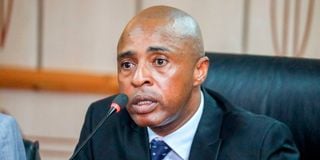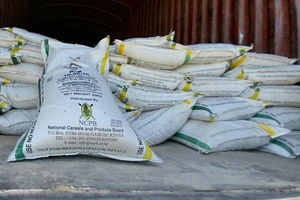
Silica Booster Limited (SBL) Innovative Manufacturers Director Josiah Kariuki addressing the National Assembly Committee on Agriculture and Livestock at the Parliament Buildings Nairobi on April 9, 2024.
An owner of a firm blacklisted over substandard fertiliser stunned MPs on Tuesday when he admitted that he is not aware of the kind of fertiliser he has been supplying to the government.
SBL Innovate Manufacturers Limited director Josiah Kariuki told the National Assembly’s Agriculture Committee that he approached the National Cereals and Produce Board (NCPB) on March 20, 2022, for a business opportunity to supply fertiliser. This was after he had used some silica-based fertiliser from African Diatomite Industries Limited (ADIL) that did well on his farm in Rumuruti, Laikipia County.
In what sounded like previous scandals like the Kenya Medical Supplies Authority saga where a passerby got a contract to supply masks and personal protective equipment, Mr Kariuki was awarded a contract by NCPB.
He told the Tigania West MP John Mutunga-led committee that together with ADIL and his other company, 51 Capital Kenya, they entered into a contract with NCPB on March 31, 2022 to supply three products: 51 Capital animal supplements, GPC-Guard and diatomaceous earth. The contract was for a period of two years with products performance review after every six months.
“We started the distribution of the products somewhere in May or June 2022 where ADIL was to manufacture and package the fertiliser and my company was the one to sell to NCPB,” said Mr Kariuki.
Mr Mutunga raised the first red flag, asking Mr Kariuki to explain how he entered into contract with NCPB yet at that time there was no legal agreement between his firm and ADIL, which was only in November 2022.
In his response, Mr Kariuki admitted that they were already selling the fertiliser even without an agreement, saying he was not the only one selling fertiliser to NCPB without a contract.
“I just told NCPB that we had a contract with ADIL and they allowed us to supply them with fertiliser. They even provided me with the bags,” he said.
Soi MP David Kiplagat asked Mr Kariuki to shed more light on how it was possible to get a distributorship contract and start trading with NCPB without a mark of quality from Kebs.
“NCPB told me not to worry about a contract or mark of quality as I could use the one for ADIL. I later formed my own company (SBL) on August 22, 2022 before approaching Kebs to get my mark of quality,” he told the committee.
The SBL boss would then apply for the mark of quality in December 2022 for supply of organic fertiliser and subsequently reached out to Francis Mukui and Flora Kirui of Kebs for assistance.
Konoin MP Brighton Yegon asked Mr Kariuki to tell the committee whether the fertiliser he has been supplying is organic, GPC or soil amendment and conditioner fertiliser.
“In 2022, it was a soil amendment and conditioner fertiliser but in 2023, it has turned into an organic fertiliser. This product you have been selling is it an organic or soil conditioner fertiliser?” added Mr Kiplagat.
However, Mr Kariuki said he cannot tell what kind of fertiliser he has been supplying, asking the committee members to refer to documents from Kebs.
“I have been selling what Kebs (Kenya Bureau of Standards) told me. I have no capacity to know the product I am selling,” he said.
In the documents submitted before the committee, SBL was issued with a permit to supply of organic fertiliser under the brand name SBL-GPC original. Other documents showed differences in the test results on the product.
On Monday, Agriculture Cabinet Secretary Mithika Linturi denied the existence of fake fertiliser, saying only 3,000 bags of substandard fertilisers have been reported in the market and the ministry was ready to compensate the affected farmers.
Mr Linturi also told the committee that there was no fertiliser under the subsidy programme distributed by SBL Innovate.
Speaking in West Pokot County on Monday, President William Ruto said farmers who were supplied fake fertiliser must be fully compensated by those responsible. He said the government will deal with fraudsters trying to undermine food production.
Additional reporting by Caroline Wafula and Stanley Kimuge









